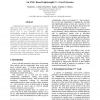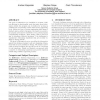151 search results - page 3 / 31 » Using Informal and Formal Techniques for the Reverse Enginee... |
IWPC
2003
IEEE
13 years 11 months ago
2003
IEEE
A lightweight fact extractor is presented that utilizes XML tools, such as XPath and XSLT, to extract static information from C++ source code programs. The source code is first co...
FATES
2003
Springer
13 years 11 months ago
2003
Springer
Most efforts to combine formal methods and software testing go in the direction of exploiting formal methods to solve testing problems, most commonly test case generation. Here we ...
DRM
2007
Springer
13 years 12 months ago
2007
Springer
The goal of obfuscation is to transform a program, without affecting its functionality, such that some secret information within the program can be hidden for as long as possible...
ICSM
2006
IEEE
13 years 11 months ago
2006
IEEE
An approach to automatically identify the stereotypes of all the methods in an entire system is presented. A taxonomy for object-oriented class method stereotypes is given that un...
WCRE
2008
IEEE
14 years 4 days ago
2008
IEEE
CAPTCHAs are automated Turing tests used to determine if the end-user is human and not an automated program. Users are asked to read and answer Visual CAPTCHAs, which often appear...


